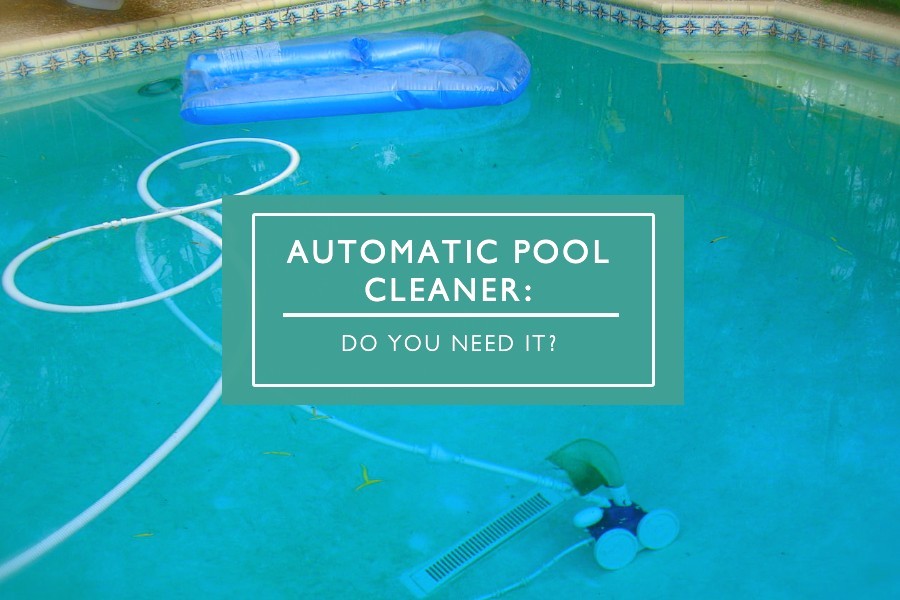Maintaining a pool is not an easy job and comes with several responsibilities. You have to regularly balance the pool water chemistry, shock your pool, and manually clean the pool surface, floors, and walls.
These tasks are time-consuming and require a lot of effort. Some of you have more important things to do than cleaning your pool. We may not be able to automate balancing and shocking, but there are new devices that can clean our pools for us - and they are called automatic pool cleaners.
Some people doubt that these automatic pool cleaners can really do the job. Let’s find out more about this device and see if it is it worth investing in it or if the money is better off going to a professional pool company to get the job done.
Automatic Pool Cleaner: Definition and Types
An automatic pool cleaner is a type of vacuum cleaner used in pools that collects dirt or debris without having to rely on human effort. How it works depends on its type and there are three different types of automatic pool cleaners:
Pressure-Side Cleaner
This type of cleaner is one of the most popular ones in the market. It uses the water pressure from the pump and filtration system to move around and force dirt or debris into the filter bag. Some cleaners need a separate pump or opt for one so it’s not taxing on their pool's systems.
There are different kinds of pressure-side cleaner on the market. You may find more expensive models if you want additional features such as a rubber wheel for a better grip or a filter bag with a zipper.
Pros
Cons
Suction-Side Cleaner
This device is more similar to a vacuum as it cleans the pool by creating suction using the filtration and pump system. It has wheels and roams across the pool floor and walls, collecting debris into the filtration system.
Pros
Cons
Robotic Pool Cleaners
Compared to the first two types, a robotic pool cleaner doesn’t need to be attached or won’t use your pump and filtration system as it has both systems built-in. They move with their motorized wheels and follow a cleaning pattern instead of randomly moving around like the first two types. They will need to be attached to a low-voltage transformer that is plugged into an outlet.
Some models also come with features such as remote control, waterline scrubbing, advanced programming of cleaning cycles, storage caddies, self-docking, rapid water release, and remote monitoring.
Pros
Cons
Here's a video that shows how the three different types of cleaner work:
How much do Automatic Pool Cleaners cost?
It depends on which type of automatic pool cleaner you want to get. The least expensive type you can get is a suction-side cleaner, which costs around $100 to $400. This type may be the cheapest but it would also do the most harm to your pump and filtration system. You also have to constantly clean your filter for it to work.
For pressure-side cleaners, you can get these for $200 to $900. The price will largely depend on the additional features you may or may not get. The most expensive ones are robotic pool cleaners which can cost $500 to $1,000. There are models less than $500 but the more expensive ones will have the best features you expect from the most technologically-advanced type.
Advantages and Disadvantages of Owning an Automatic Pool Cleaner
Advantages
Disadvantages
The Verdict
If you're planning on buying an automatic pool cleaner because you want to stop cleaning your pool, then you shouldn't get one. You can’t rely on automatic pool cleaners to do all the cleaning alone as you have to watch over these devices.
It’s still best to handle all the tasks of cleaning and maintaining your pool, especially if it’s not that big. Getting an automatic pool cleaner may save us some time as they lessen the dirt or debris we have to clean. However, you will still have to skim the pool surface as they only clean the walls and floor.
If you really don’t have time, the money is better off going to a professional pool maintenance company, especially if you have a limited budget. They can handle all the tasks quickly and efficiently thanks to their experience and skills. The hundreds you will spend on an automatic pool cleaner can probably cover months of professional cleaning.


My suction side Hayward navigator pool cleaner does not pull up leaves. It gets jammed and has to be pulled from the pool and cleaned out. Would a robotic type be a better solution?
Higher end robotics can handle leaves, but a high volume of leaves will give any a problem.